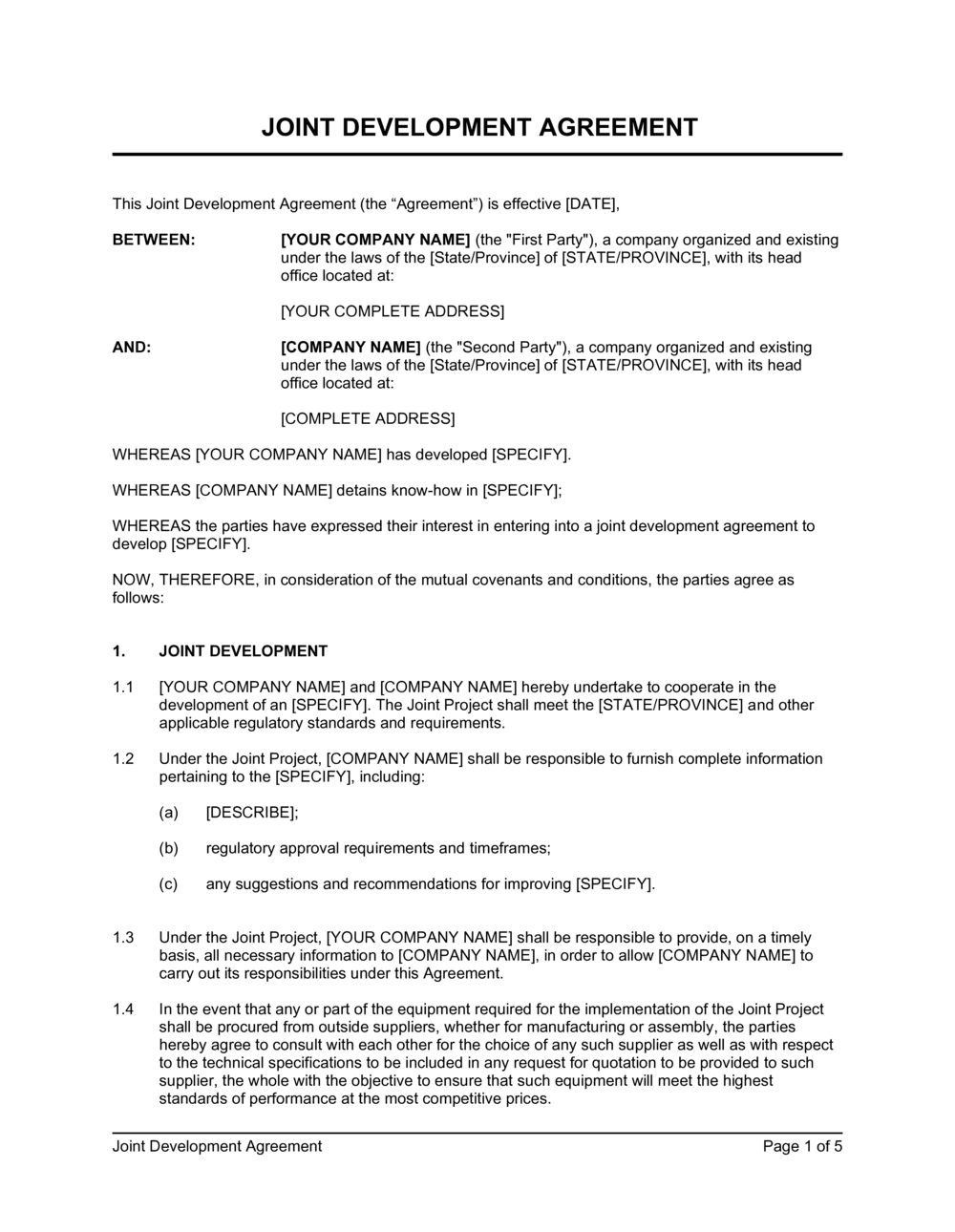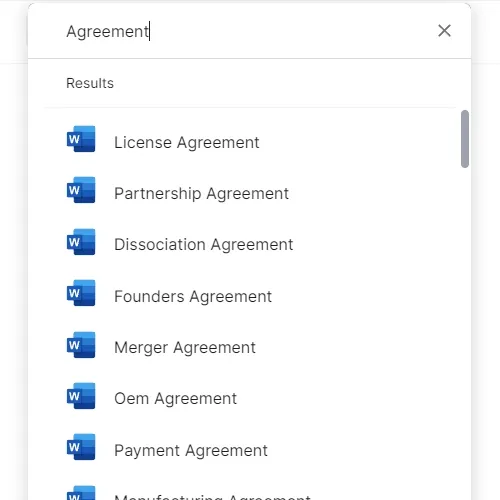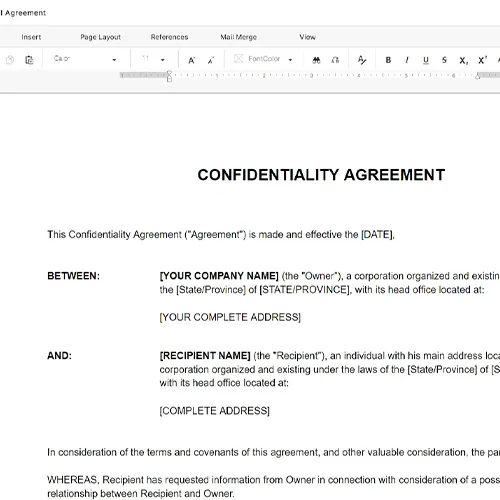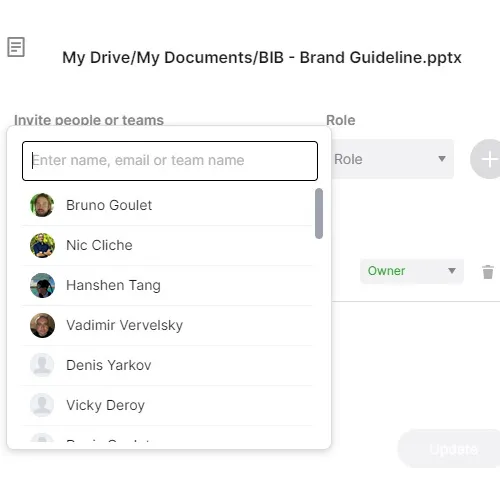Joint Development Agreement Standard Template

Understanding a Joint Development Agreement
In the ever-evolving landscape of innovation and collaboration, joint development projects stand as a cornerstone for pooling resources, knowledge, and expertise between parties. A Joint Development Agreement (JDA) is a critical legal framework that outlines the cooperative efforts of two or more entities to develop new products, technologies, or services together. This agreement sets the foundation for a successful partnership by clearly defining the roles, responsibilities, and expectations of all involved parties, ensuring that each contributor’s investments are protected while fostering a spirit of innovation.
What is a Joint Development Agreement?
A Joint Development Agreement is indispensable for companies aiming to leverage collective strengths to innovate and gain competitive advantages. It is designed to manage the complexities of collaboration, such as intellectual property rights, resource sharing, and profit distribution. By formalizing the relationship and terms of a joint venture, JDAs help prevent conflicts and ensure that all contributions and benefits are fairly allocated.
Key Components of a Joint Development Agreement
- Parties Involved - Lists all entities entering into the agreement, typically companies or organizations.
- Scope of Development - Clearly defines the project scope, including the goals, deliverables, and timelines.
- Contribution of Resources - Details the resources each party will contribute, which may include capital, personnel, equipment, or intellectual property.
- Ownership of Outcomes - Specifies how the outcomes, including patents and other IP rights, will be owned and managed.
- Revenue Sharing - Outlines how revenues and profits generated from the project will be shared.
- Confidentiality and Non-Disclosure - Ensures that sensitive information shared during the collaboration is protected.
Structuring a Joint Development Agreement
Creating an effective Joint Development Agreement requires a strategic approach to ensure all aspects are covered comprehensively and fairly. The agreement should be:
- Balanced - Equitably structured to reflect the input and risks taken by each party.
- Flexible - Able to adapt to changes in project scope or market conditions without undue hardship.
- Legally Enforceable - Compliant with applicable laws and regulations to ensure enforceability.
Supporting Documents for Implementing a Joint Development Agreement
To enhance the effectiveness of a Joint Development Agreement, consider integrating related legal documents:
- Non-Disclosure Agreement - Protects proprietary information exchanged during the collaboration.
- Memorandum of Understanding - Establishes the preliminary commitments and framework before the final JDA is signed.
- Technology Licensing Agreement - If existing technologies are used, this agreement governs the terms under which they are licensed.
Why Use Business in a Box to Create a Joint Development Agreement?
Employing Business in a Box to draft your Joint Development Agreement offers:
- Professionally Designed Templates - Ensures your agreement is precise, current, and compliant with relevant laws.
- Customizability - Enables modifications to suit the specific collaboration dynamics and goals.
- Efficiency - Accelerates the document preparation process, facilitating prompt finalization and adoption.
- Comprehensive Toolkit - Provides additional resources supporting a wide range of business needs, from legal to project management.
Utilizing Business in a Box for your Joint Development Agreement lays out a professional and meticulous foundation for delineating the operations of a collaborative project. It is an essential document that ensures clear direction and consensus among partners, thereby reinforcing the project’s resilience against operational conflicts and facilitating a strategic approach to innovation and market expansion.
Updated in April 2024
Reviewed on

Understanding a Joint Development Agreement
In the ever-evolving landscape of innovation and collaboration, joint development projects stand as a cornerstone for pooling resources, knowledge, and expertise between parties. A Joint Development Agreement (JDA) is a critical legal framework that outlines the cooperative efforts of two or more entities to develop new products, technologies, or services together. This agreement sets the foundation for a successful partnership by clearly defining the roles, responsibilities, and expectations of all involved parties, ensuring that each contributor’s investments are protected while fostering a spirit of innovation.
What is a Joint Development Agreement?
A Joint Development Agreement is indispensable for companies aiming to leverage collective strengths to innovate and gain competitive advantages. It is designed to manage the complexities of collaboration, such as intellectual property rights, resource sharing, and profit distribution. By formalizing the relationship and terms of a joint venture, JDAs help prevent conflicts and ensure that all contributions and benefits are fairly allocated.
Key Components of a Joint Development Agreement
- Parties Involved - Lists all entities entering into the agreement, typically companies or organizations.
- Scope of Development - Clearly defines the project scope, including the goals, deliverables, and timelines.
- Contribution of Resources - Details the resources each party will contribute, which may include capital, personnel, equipment, or intellectual property.
- Ownership of Outcomes - Specifies how the outcomes, including patents and other IP rights, will be owned and managed.
- Revenue Sharing - Outlines how revenues and profits generated from the project will be shared.
- Confidentiality and Non-Disclosure - Ensures that sensitive information shared during the collaboration is protected.
Structuring a Joint Development Agreement
Creating an effective Joint Development Agreement requires a strategic approach to ensure all aspects are covered comprehensively and fairly. The agreement should be:
- Balanced - Equitably structured to reflect the input and risks taken by each party.
- Flexible - Able to adapt to changes in project scope or market conditions without undue hardship.
- Legally Enforceable - Compliant with applicable laws and regulations to ensure enforceability.
Supporting Documents for Implementing a Joint Development Agreement
To enhance the effectiveness of a Joint Development Agreement, consider integrating related legal documents:
- Non-Disclosure Agreement - Protects proprietary information exchanged during the collaboration.
- Memorandum of Understanding - Establishes the preliminary commitments and framework before the final JDA is signed.
- Technology Licensing Agreement - If existing technologies are used, this agreement governs the terms under which they are licensed.
Why Use Business in a Box to Create a Joint Development Agreement?
Employing Business in a Box to draft your Joint Development Agreement offers:
- Professionally Designed Templates - Ensures your agreement is precise, current, and compliant with relevant laws.
- Customizability - Enables modifications to suit the specific collaboration dynamics and goals.
- Efficiency - Accelerates the document preparation process, facilitating prompt finalization and adoption.
- Comprehensive Toolkit - Provides additional resources supporting a wide range of business needs, from legal to project management.
Utilizing Business in a Box for your Joint Development Agreement lays out a professional and meticulous foundation for delineating the operations of a collaborative project. It is an essential document that ensures clear direction and consensus among partners, thereby reinforcing the project’s resilience against operational conflicts and facilitating a strategic approach to innovation and market expansion.
Updated in April 2024
Easily Create Any Business Document You Need in Minutes.

Download or open template
Access over 3,000+ business and legal templates for any business task, project or initiative.

Edit and fill in the blanks
Customize your ready-made business document template and save it in the cloud.

Save, Share, Export, or Sign
Share your files and folders with your team. Create a space of seamless collaboration.


